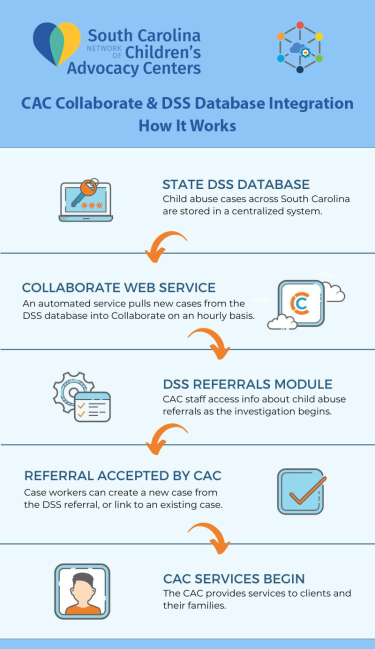Collaborate Database
Children’s Advocacy Centers (CACs) in South Carolina are required by accreditation standards to maintain a database for tracking medical, mental health, forensic interview, prevention, and other services provided to child victims, family members, and caregivers. These databases must include essential demographic details, case information, and investigation or intervention outcomes. In the past, all CACs in South Carolina used separate, independently managed databases with varying formats and functions. This lack of standardization made coordinated services difficult and created gaps in care. A 2018 CAC needs assessment by the South Carolina Network of Children’s Advocacy Centers (SCNCAC) identified these gaps and other service barriers. The SCNCAC Development Plan outlined recommendations to address these challenges, including the creation of a statewide CAC database and integration with the South Carolina Department of Social Services (DSS) CAPSS system used by Child Protective Services.
In late 2019, SCNCAC launched the statewide CAC Collaborate database, which enhances coordination between agencies, reduces service duplication, improves allocation of mental health and medical resources, and helps prevent child abuse cases from being overlooked due to disconnected systems. The statewide database is provided as a service to SCNCAC member CACs to support consistent, effective, and collaborative child protection efforts.

SCNCAC DSS Database Integration
The next phase of the database project focused on developing an integration between the Collaborate database system managed by SCNCAC and the CAPSS database system operated by DSS. This integration was designed to provide automated case information from DSS to CACs for cases meeting the CAC case acceptance criteria outlined in the South Carolina Child Abuse Response Protocol Act.
In early 2020, technical development began at the IT level, including work on security certificates, required data elements, information transfer structures, web services, and coding requirements to enable secure and efficient database interaction. Final testing and system refinements continued throughout 2021.
On June 15, 2022, the automated case information system officially went live, enabling hourly data transfers from DSS to CACs through the SCNCAC Collaborate database bridge. This integration significantly enhances coordination between DSS and CACs, ensuring that all child abuse victims across South Carolina receive timely, evidence-based services regardless of where they live. SCNCAC is grateful for the partnership and dedicated efforts of DSS and the technical teams who helped make this critical initiative a reality.

Until recently, when an automated case information referral was transmitted from the CAPSS database at DSS to a CAC through the Collaborate database bridge managed by SCNCAC, a DSS investigator would be assigned. The DSS investigator would then complete a CAC request for services form. This form was then emailed, faxed, or hand delivered to the CAC to schedule a forensic interview or other CAC services. Because each CAC used its own version of the request for services form—often requiring different information—this created inefficiencies and challenges for DSS and other multidisciplinary team (MDT) partners who worked across multiple counties in South Carolina.
On October 3, 2025, the final phase of the DSS CAPSS and SCNCAC Collaborate database integration went live. This phase introduced a standardized SCNCAC CAC request for services form that DSS investigators and MDT partners can now complete electronically and securely transmit through the integrated database systems. The electronic form is then attached to the DSS automated case information referral within the Collaborate system, ensuring the CAC receives all necessary information to schedule more timely services for the child and family.
This final integration phase streamlines CAC and DSS workflows, reduces duplicative data entry, minimizes the potential for human error during the referral and intake process, and further strengthens the statewide, coordinated response to child abuse in South Carolina.
SCNCAC Member Collaborate Database Information
SCNCAC provides information and announcements regarding the Collaborate CAC database for member CAC staff and MDT partners through our member web-based professional networking community SCNCAC Connect. Members can use the button below to log in to SCNCAC Connect. Once on the SCNCAC Connect home page, you will see important announcements on the dashboard. All announcements and information important for members using the Collaborate Database are also posted in the Collaborate forum. In the left column of the SCNCAC Connect home page, there is a forum link where information on the database is posted for members. We encourage all members who are using the database to check the Collaborate Forum regularly to keep up to date about important database announcements and information.
*Document Viewing Instructions
Document buttons with an asterisk indicate the document will open in a web viewer. You can view the document in full screen mode and download a PDF version by using the control buttons at the bottom of the web viewer page. You can also use your computer mouse or the arrow buttons on your keyboard to advance the pages in the document. The web viewer will work on all devices but if the images are not clear or you would like a PDF version, use the button at the bottom of the viewer to download a PDF version of the document.
